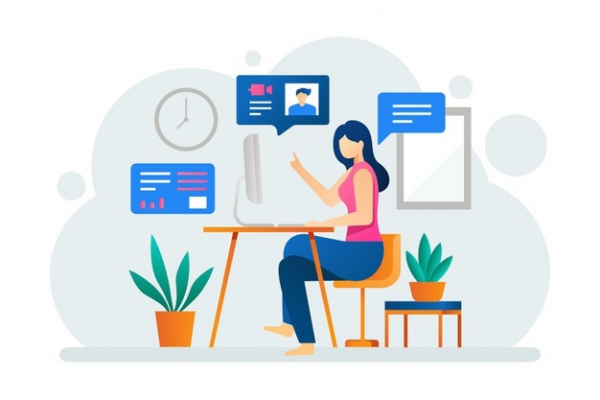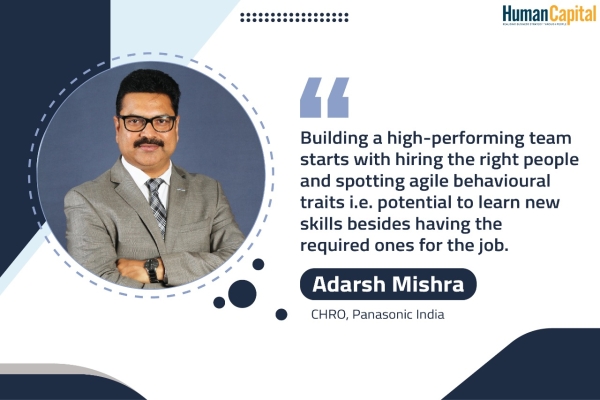As we continue to work remotely and physically distanced, there are opportunities for organizations and leaders to foster a culture of adaptability, inclusion and agility. In this new normal, technology transformation, new skills, new business models, changing consumer behaviour and workplace transformation are major drivers that will shape the future of work and the workforce.
To build a new age work culture that will help fuel the next wave of growth, we will have to orient our mindsets and imbibe and internalise the key vectors given below.
Remote working
There has been a widespread shift to remote work in 2020 fueled by the pandemic. Enabled by the suite of technology platforms and tools, it catapulted organizations and workforce to quickly adapt to new ways of working. However, it is essential to accomplish this adaptation in a humane manner so that employees feel included and valued, taking into consideration their actual needs - technology enablement on the ground
Trust, safety, and wellbeing continues to play a vital role in the remote workplace as it creates a highly supportive environment for WFH to be effective for all employee segments. At Edelweiss, we redesigned the workplace with new norms of hygiene, sanitation and social distancing. Also, what is important is that all employees who come to office in the return phase feel safe and secure. Perceived safety is a key aspect which will assume greater significance in the new normal.
Next, establishing policies and norms is crucial to equip teams to thrive in a remote environment. Enabling them with flexibility when working from home is important to balance their family commitments especially if there are children, dependents or parents at home. Tailored solutions can address different engagement and efficiency needs of remote and non-remote employees.
As we continue to adapt to new ways to work and being physically distanced from our co-workers, families and friends, we understand that this may disrupt routines causing potential anxiety, stress and strain – physically, mentally and emotionally. We need to be sensitive to these needs and support employees. At Edelweiss, counselling services have been made available to employees and their family members along with other digital well-being enablements.
Further, communicating clearly on work expectations is important for work effectiveness and it is also vital that employees feel valued at their job and are coached to be successful. Leaders play a vital role in constantly communicating with employees on the current status and directionally enabling them on how they can contribute.
At Edelweiss, we encourage two-way communication to increase trust. Also, communication with remote and field employees quadrupled through the leader’s connect platform.
Lastly, modelling behaviors which value having a foundation of purpose, involvement, respect, equality and camaraderie can help employees adopt to new ways of working and interacting. Thus, cultivating a culture of inclusion and psychological safety has become all pervasive.
Building Digital Culture
Today, traditional ways of doing business is quickly transforming due to growth in technology. The Pandemic has accelerated this transformation for organizations as they strive hard to stay focused on productivity, cost savings and agility of workforce and business. At the same time, employees are also keeping up with digital trends. This new digital workplace is creating an opportunity to create better employee experience with speedy services and hyper personalization across different employee segments.
Digital technologies have also dramatically impacted the culture around work and working. At Edelweiss, technology platforms and tools enable employees to stay digitally connected with their teams, co-workers. It supports digital integration of workforce to collaborate while they remain in the safety net of physical distance relevant to today’s times.
To meet the shift in engagement needs of employee, digital engagement platforms enable motivation of workforce by creating online team recognition, peer-to-peer recognition or real-time acknowledgment of efforts. In a digital culture, re-engaging with employees in more inclusive ways to build on social capital is important as it will place them in a better position, while transitioning to the return phase.
Digital environment of “always on” connectedness also comes with its challenges like blurring of lines between “work time” and “outside of work time”, online etiquettes with teams, stakeholders, customers and data security. Hence, constant communication to educate employees about these nuances is key to a digital culture.
Building talent pipeline
Virtual setup and increase in social connectedness has opened opportunities to new ways of acquiring, developing and managing talent and work. Talent reach is now beyond office locations. Changing consumer behavior and rapid digitalization are compelling organizations to re-model their workforce. New business priorities will need to re-design teams to deploy diverse talent across org structures, while keeping its focus on cost and productivity. This has led most organizations to to re-examine their org structures and talent maps with a new lens - core and non-core roles as well as roles that can be virtual even post the pandemic. In addition, talent perception around work and working and overall work culture is also changing. With the rise of social media, talent can now be more aware of org culture.
To navigate this internal and external flux, a resilient talent strategy is essential, which balances the buy and build practices strategically. Organizations can now tap into adjacent talent pools like gig workers, returning women, non-domain backgrounds, veterans, people with disability and new parents. Also, knowing which skills to tap from the market to bring in competitive advantage is vital.
While we look at newer sources of skills acquisition, building on internal expertise and skilling is equally important. Such efforts require business leaders to educate employees on what skills to be developed and employees to take initiative on pursuing them with dedication to learn and expand their value. Further, irrespective of acquisition or skilling, nurturing this pipeline is key to meaningful engagement, promoting curiosity and exploration which can help business and the brand in near and long term.
Upskilling/Reskilling
It has been predicted that most of the skills across industries will transform leading to skills mismatch and skills gap. This will also have impact on the career trajectories of the workforce. Continuous technological advancements are reshaping the way we work. Hence, optimizing current potential of the workforce, creating hybrid talent models will be key to be productive, innovative and adaptive.
For this, an agile learning culture which creates adaptive learning mindsets to meet current and emerging learning challenges is important. Becoming familiar with the existing skills and gaining a deeper understanding of market demand of future skills will be required for reskilling and upskilling.
To cater to diverse learning styles, the endeavor should be to create and sustain learnability quotient thus empowering the workforce to stay invested in their individual growth. This will need a shift where content framework and delivery platforms must be learner-centric, offering real, experience-based learning which fuels innovation and collaboration.

Do you think hybrid work arrangements would be a common feature of the workplaces going forward?
Trending
-
SBI General Insurance Launches Digital Health Campaign
-
CredR Rolls Out 'Life Happens' Leave For Its Employees
-
Meesho Announces 30-Week Gender-Neutral Parental Leave Policy
-
Microsoft Unveils Tech Resilience Curriculum To Foster An Inclusive Future
-
60% Indian Professionals Looking For Job Change Due To COVID: Survey
-
SpringPeople And Siemens Collaborate For Digital Transformation Push
-
86% Professionals Believe Hybrid Work Is Essential For Work Life Balance: Report
-
Almost 1 In Every 3 People's Personal Life Affected Due To Work Stress
-
Meesho Rolls Out Reset And Recharge Policy For Employees
-
80% Of Talent Leaders & Academics Say Pandemic Changed Skill Needs For Youth: Report
-
Hero Electric Rolls Out 'Hero Care' Program For Employees
-
Human Capital In Collaboration With ASSOCHAM Hosts Virtual Conference
-
IKEA India, Tata STRIVE Collaborate To Create Employability And Entrepreneurship Opportunities
-
SAP India, Microsoft Launch Tech Skilling Program for Young Women
-
DXC Technology, NASSCOM Collaborate For Employability Skills Program
-
Lenskart To Hire Over 2000 Employees Across India By 2022
-
Mindtree Launches Learn-and-Earn Program
-
Tata AIA Extends 'Raksha Ka Teeka' To Its Employees
-
Swadesh Behera Is The New CPO Of Titan
-
NetConnect Global Plans To Recruit 5000 Tech Professionals In India
-
Hubhopper Plans To Hire 60% Of Indian Podcasters By 2022
-
Corporate India Needs More Women In Leadership Roles: Report
-
Aon to Invest $30 Million and Create 10,000 Apprenticeships by 2030
-
Tech Mahindra Launches ‘Gift a Career’ Initiative for Upskilling of Youth
-
40% Women Prefer Flexible Working Options in Post-COVID World: Survey
-
3 out of 4 companies believe they can effectively hire employees virtually: Report
-
Vodafone , CGI and NASSCOM Foundation launch digital skills platform
-
Odisha: Bank, postal employees to deliver cash for elderly, differently-abled persons
-
Skill India launches AI-based digital platform for "Skilled Workforce"
-
Hiring activity declines 6.73% in first quarter: Survey
-
70% startups impacted by COVID-19 pandemic
-
Bajaj Allianz Life ropes in Santanu Banerjee as CHRO
-
Over 70 Percent MSMEs look at cutting jobs to sustain businesses
-
93 Per Cent employees stressed about returning to office post-lockdown
-
Johnson & Johnson India announces family benefits for same gender partners
-
Indian firms turning friendly towards working mothers
-
Welspun India names Rajendra Mehta as new CHRO
-
Wipro partners with NASSCOM to launch Future Skills platform



Human Capital is niche media organisation for HR and Corporate. Our aim is to create an outstanding user experience for all our clients, readers, employers and employees through inspiring, industry-leading content pieces in the form of case studies, analysis, expert reports, authored articles and blogs. We cover topics such as talent acquisition, learning and development, diversity and inclusion, leadership, compensation, recruitment and many more.
Subscribe Now












































Comment